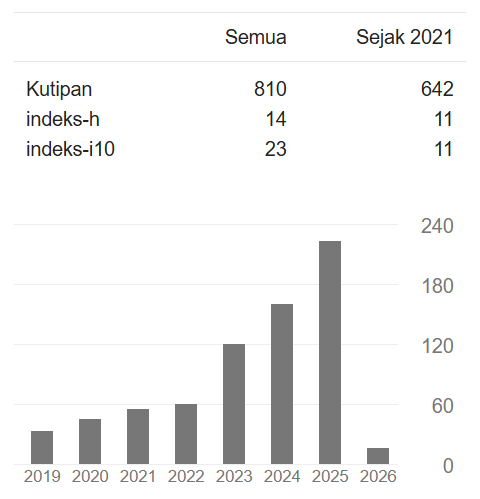THE PATH TO SPIRITUALITY
A CRITIQUE OF MEREDITH B. MCGUIRE’S VIEW ON SPIRITUALITY AND MATERIALITY
DOI:
https://doi.org/10.20871/kpjipm.v10i2.378Keywords:
Body, Materiality, Physical, Psychology, SpiritualityAbstract
This article critiques McGuire’s (2008) work on Spirituality and Materiality: Why Bodies Matter? in the book Lived Religion: Faith and Practice in Everyday Life. In her work, McGuire challenges the traditional Western dichotomy between spirituality and materiality, which places the two in a binary opposition. She argues that spiritual experiences are closely connected to the body and physical environment. This article aims to analyze the main strengths of McGuire’s work, particularly its strong empirical foundation through qualitative research methods, such as interviews and observations, which enhance the credibility of her arguments. However, several weaknesses are identified in this study. First, McGuire does not clearly define spirituality, leading to ambiguous interpretations. Second, her generalization that material aspects are always involved in achieving spirituality overlooks the possibility of non-material approaches, such as meditation or introspection. Third, the work neglects psychological factors that influence individual spiritual experiences, such as trauma or motivation. Fourth, the concept of materiality is problematic, as she does not adequately explain how it leads to spiritual experiences. Lastly, McGuire’s in some cases’ use of her personal experiences as a basis for her arguments could introduce bias, as spirituality is highly subjective and varies for each individual. This study employs a qualitative approach to provide an in-depth analysis of McGuire’s work and relevant literature on spirituality and materiality, focusing on how different traditions define and practice spirituality, particularly about pathways that emphasize non-material aspects in achieving spiritual experiences.
Downloads
References
Bartolini, Nadia, Sara MacKian, and Steve Pile. 2019. “Spirit Knows: Materiality, Memory and the Recovery of Spiritualist Places and Practices in Stoke-on-Trent.” Social & Cultural Geography 20 (8): 1114–37. https://doi.org/10.1080/14649365.2017.1419278.
Besecke, Kelly. 2007. “Beyond Literalism: Reflexive Spirituality and Religious Meaning.” In Everyday Religion: Observing Modern Religious Lives, edited by Nancy T. Ammerman. New York, USA: Oxford University Press, Inc.
Creswell, John W., and J. David Creswell. 2018. Research Design Qualitative, Quantitative, and Mixed Methods Approaches. USA: SAGE Publications, Inc.
Denend, Jessica Van, Kayla Ford, Pauline Berg, Ellen L. Edens, and James Cooke. 2022. “The Body, the Mind, and the Spirit: Including the Spiritual Domain in Mental Health Care.” Journal of Religion and Health 61 (5): 3571–88. https://doi.org/10.1007/s10943-022-01609-2.
Fisher, Mary Pat, and Robin Rinehart. 2017. Living Religions (10th Edition) - Standalone Book. 10th edition. Boston: Pearson.
Forlenza, Orestes V., and Homero Vallada. 2018. “Spirituality, Health and Well-Being in the Elderly.” International Psychogeriatrics 30 (12): 1741–42. https://doi.org/10.1017/S1041610218001874.
Forster, Dion A., and George W. Marchinkowski. 2024. “The Ordinary and the Mystical? Exploring the Intersections of Spirituality and Public Theology.” HTS Teologiese Studies / Theological Studies 80 (1): 8. https://doi.org/10.4102/hts.v80i1.9915.
Hegazy, Wael. 2021. “The Salience of Saintliness in Islam: A Sufi Perspective.” Teosofi: Jurnal Tasawuf dan Pemikiran Islam 11 (1): 1–19. https://doi.org/10.15642/teosofi.2021.11.1.1-19.
Hope, Meredith O., Ann W. Nguyen, Robert Joseph Taylor, and Linda M. Chatters. 2024. “Correlates of Spirituality among African American and Black Caribbean Emerging Adults.” Religions 15 (3): 341. https://doi.org/10.3390/rel15030341.
Inbadas, Hamilton. 2016. “History, Culture and Traditions: The Silent Spaces in the Study of Spirituality at the End of Life.” Religions 7 (5): 53. https://doi.org/10.3390/rel7050053.
Khan, Maulana Wahiduddin. 2022. Spirituality in Islam. New Delhi, India: CPS International Center for Peace and Spirituality.
Liu, Yixuan. 2024. “A Comparative Study of Medieval Religious Spirituality: Bonaventure’s Theory of Six Stages of Spirituality and Śaṅkara’s Sixfold Practice Theory of Advaita Vedānta.” Religions 15 (1): 39. https://doi.org/10.3390/rel15010039.
Manolea, Aliodor. 2019. “Silence as A Method of Initiation into Spirituality.” Romanian Journal of Psychological Studies 7 (1): 36–43.
Maslow, Abraham H. 1970. Religions, Values, and Peak-Experiences. New York: Viking Penguin Inc.
———. 2017. A Theory of Human Motivation. Dancing Unicorn Books.
McGuire, Meredith. 2007. “Embodied Practices: Negotiation and Resistance.” In Everyday Religion: Observing Modern Religious Lives, edited by Nancy T. Ammerman. New York, USA: Oxford University Press, Inc.
———. 2008. “Spirituality and Materiality: Why Bodes Matter?” In Lived Religions: Faith and Practice in Everyday Life, 97–118. New York, USA: Oxford University Press.
McGuire, Meredith B. 2003. “Why Bodies Matter: A Sociological Reflection on Spirituality and Materiality.” Spiritus: A Journal of Christian Spirituality 3 (1): 1–18. https://doi.org/10.1353/scs.2003.0017.
Nelson, James M., and Noelle Canty. 2023. “Positive Psychology and the Psychology of Religion and Spirituality in Historical Perspective.” In Handbook of Positive Psychology, Religion, and Spirituality, edited by Edward B. Davis, Everett L. Worthington Jr., and Sarah A. Schnitker, 21–35. Cham: Springer International Publishing. https://doi.org/10.1007/978-3-031-10274-5_2.
Paradies, Yin, and Cullan Woods Joyce. 2024. “From Esotericism to Embodied Ritual: Care for Country as Religious Experience.” Religions 15 (2): 182. https://doi.org/10.3390/rel15020182.
Pargament, Kenneth I. 2007. Spiritually Integrated Psychotherapy: Understanding and Addressing the Sacred. Implicit Religion. New York: The Guilford Press.
Schiffman, Mark, Aaron Cherniak, Eliezer Schnall, Suzanne Brooks, Steven Pirutinsky, and Devora Shabtai. 2023. “Positive Psychology and Judaism.” In Handbook of Positive Psychology, Religion, and Spirituality, edited by Edward B. Davis, Everett L. Worthington Jr., and Sarah A. Schnitker, 163–77. Cham: Springer International Publishing. https://doi.org/10.1007/978-3-031-10274-5_11.
Smart, Ninian. 1996. Dimensions of the Sacred: Anatomy of the World’s Beliefs. Journal GEEJ. Vol. 7. United Kingdom: University of California Press.
Stillman, Tyler F., Frank D. Fincham, Kathleen D. Vohs, Nathaniel M. Lambert, and Christa A. Phillips. 2012. “The Material and Immaterial in Conflict: Spirituality Reduces Conspicuous Consumption.” Journal of Economic Psychology 33 (1): 1–7. https://doi.org/10.1016/j.joep.2011.08.012.
Sullivan, Susan Crawford. 2011. Living Faith Everyday Religion and Mothers in Poverty. Vol. 16. London: The University of Chicago Press Ltd.
Trisakti, Sonjoruri Budiani. 2007. “Konsep Materialitas-Spiritualitas dalam Historisitas Pierre Teilhard De Chardin.” Jurnal Filsafat 1 (1): 67–75. https://doi.org/10.22146/jf.31653.
Voulgaraki-Pissina, Evi. 2023. “Theology, Witness, and Spirituality in a Post-Secularized Historical Context.” Religions 14 (2): 179. https://doi.org/10.3390/rel14020179.
Downloads
Published
How to Cite
Issue
Section
License
Copyright (c) 2024 Fatkhuri Fatkhuri, Dody S. Truna, Neng Hannah

This work is licensed under a Creative Commons Attribution 4.0 International License.





























